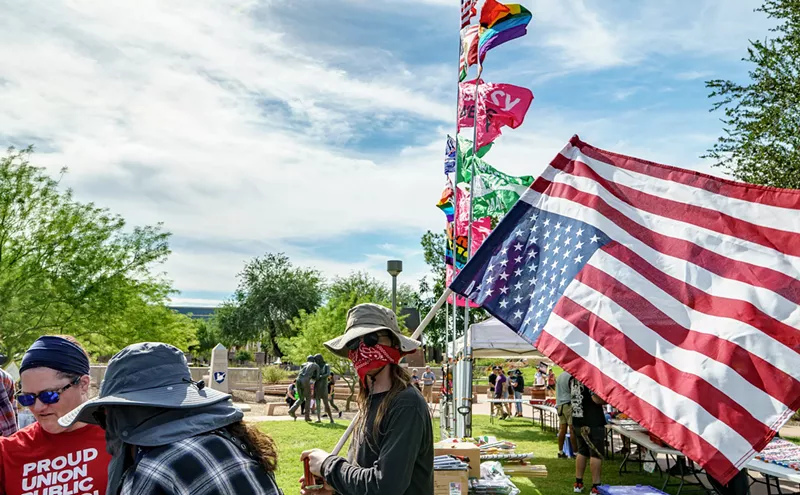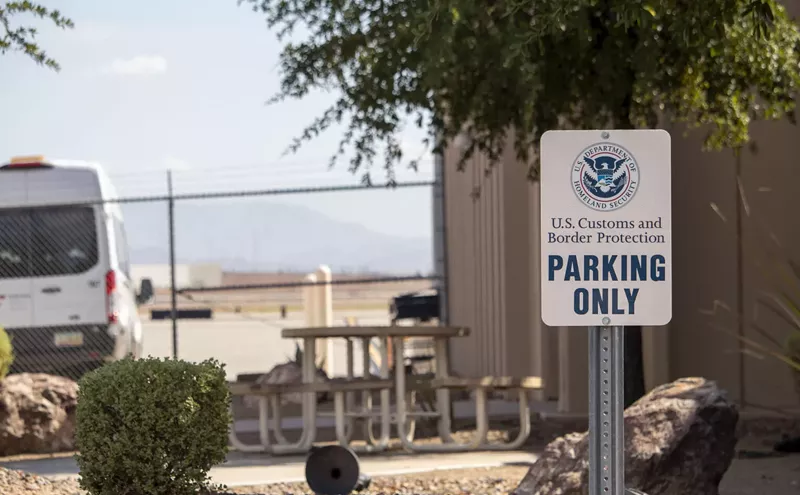A three-day riot at an Arizona private prison that sent 13 people to the hospital and led to the relocation of more than 1,000 inmates earlier this month was driven, in part, by poor living conditions, according to the prisoner rights organization Middle Ground Prison Reform.
In a letter delivered to Governor Doug Ducey on Friday, the nonprofit outlines complaints obtained from family members of inmates housed at Arizona State Prison-Kingman, including allegations of violence and inadequate access to food and medical care.
“Contrary to the belief of many in prison administration, government, and media, most prison disturbances are not the result of inmate organization; they are due to administrative disorganization,” writes Donna Leon Hamm, executive director, and James Hamm, director of legal services. “When administrative or program staff are not accessible to inmates, or act as though their attention to the inmate’s issues or problems is a nuisance … tension builds up.”
Issa Arnita, director of corporate communications for Management & Training Corp., the Utah-based company that operates the prison, says an initial investigation into the riot shows "it was caused by a small group of inmates attempting to harm another offender."
"A full investigation is underway to determine what led up to the unrest," he says.
Middle Ground describes a violent atmosphere rife with drug dealing that is enabled by staff misconduct and improper security practices.
“Some staff are reported to be regular importers of controlled substances, which are provided to inmates who subsequently sell them on the yard,” they write. “The introduction of drugs on any prison yard facilitates the problems associated with drug dealing, extortion, debt repayment, threats, and assaults.”
Fighting among inmates is “routine” at Kingman, Middle Ground reports, which suggests the Arizona Department of Corrections system of classifying inmates “is not working in an acceptable manner.”
Private prisons in Arizona are authorized to house only minimum- and medium-custody inmates, but former and current department employees tell New Times that more dangerous inmates are frequently reclassified in order to fill beds the government has contracted to pay for.
“Is the department simply ‘winking’ at its own classification scheme?” Middle Ground asks.
Staff frequently uses pepper spray, not just to control fighting, but as “acts of cruelty,” and kick inmates when they are handcuffed on the ground, defenseless, according to the report. In one case, a Muslim inmate returning from Ramadan prayers was maced and beaten when he asked for a meal to break his fast.
Middle Ground also alleges that food is of poor quality and is not being delivered in a timely manner.
If inmates have a visitor, they are not served breakfast or lunch, presumably because family members are expected to purchase them food from a vending machine in the visitation area.
“It is an invalid assumption that all prison visitors possess the money to purchase vending machine foods for an inmate, especially at the exorbitant prices charged,” they write. “If an inmate arrives at visitation at 9 a.m. and leaves at noon, he should be provided both breakfast and lunch by the prison.”
Inmates are also frustrated about the difficulty of obtaining medical care, according to Middle Ground.
One woman tells New Times, for example, that her husband was prescribed Oxygen for severe migraines but was not allowed to use it. When he complained of lockjaw, he was “ignored” and “made to believe that he was being a hypochondriac."
Another family filed a legal claim against the state for failing to get Neil Early prompt care after he was sexually assaulted and beaten at Kingman. It allegedly took prison administrators two hours to call emergency responders. He later died from his injuries.
In the letter, Middle Ground calls on Ducey to examine, not only “What can we do to punish the perpetrators?” of the riot, but also, “Did we contribute to the cause of this riot?” and “How can we change things to avoid another riot in the future?”
In particular, the group asks for an investigation of the Department of Correction’s inmate-classification process, and the private prison administration’s approach to violence, food, temperature control, and visitation practices.
“Business as usual is unacceptable now,” they write. “There is strong likelihood that signs of unrest at the Kingman prison had been brewing long before the July 2015 riots. But if administrators don’t care or aren’t skilled enough to notice, then something is terribly wrong and needs to be corrected.”

Audio By Carbonatix
[
{
"name": "GPT - Billboard - Slot Inline - Content - Labeled - No Desktop",
"component": "21251496",
"insertPoint": "2",
"requiredCountToDisplay": "2"
},{
"name": "STN Player - Float - Mobile Only ",
"component": "21327862",
"insertPoint": "2",
"requiredCountToDisplay": "2"
},{
"name": "Editor Picks",
"component": "16759093",
"insertPoint": "4",
"requiredCountToDisplay": "1"
},{
"name": "Inline Links",
"component": "17980324",
"insertPoint": "8th",
"startingPoint": 8,
"requiredCountToDisplay": "7",
"maxInsertions": 25
},{
"name": "GPT - 2x Rectangles Desktop, Tower on Mobile - Labeled",
"component": "21934225",
"insertPoint": "8th",
"startingPoint": 8,
"requiredCountToDisplay": "7",
"maxInsertions": 25
},{
"name": "Inline Links",
"component": "17980324",
"insertPoint": "8th",
"startingPoint": 12,
"requiredCountToDisplay": "11",
"maxInsertions": 25
},{
"name": "GPT - Leaderboard to Tower - Slot Auto-select - Labeled",
"component": "17012245",
"insertPoint": "8th",
"startingPoint": 12,
"requiredCountToDisplay": "11",
"maxInsertions": 25
}
]











